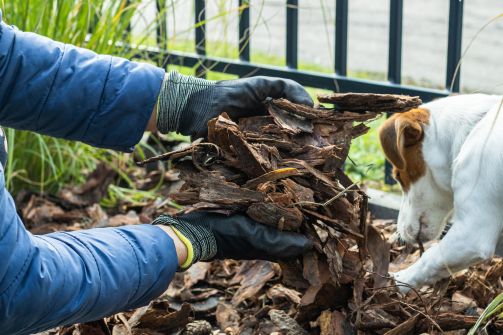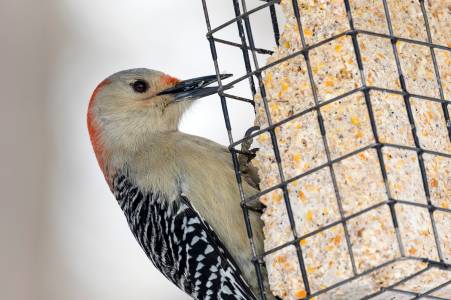Connect with a verified veterinarian in minutes. Licensed vets are available 24/7 to answer your questions. No need to worry about your furry family member.
Mulch is commonly used in gardens at home or around businesses. It serves multiple purposes; however, it can be attractive to some dogs. But what happens if a dog eats mulch?
Has your dog eaten mulch? Are you worried the mulch will make your dog sick? If so, you’ve come to the right place. We understand it can be scary when your dog eats something like this.
We’ve put together information about mulch and whether it can make a dog sick. Let’s get started!
What is Mulch?
Mulch is a layer of material that can be applied to the surface of garden soil. Mulch can be made of natural substances; however, it can also be made of synthetic materials.
Mulch can be used to retain soil moisture, regulate soil temperature, keep weeds from growing, and for aesthetics. It can be applied to the surface of the soil around trees, flower beds, and paths to keep dirt from eroding and to help produce crops.
Organic mulch may be made of:
- Grass clippings
- Woodchips
- Whole bark nuggets
- Straw or hay
- Leaves
- Animal manure
- Newspaper
- Cardboard
- Wool
- Cocoa beans
- Rock or gravel
- And more
Synthetic mulch may be made from:
- Plastic sheeting
- Rubber
- Polypropylene or polyethylene
While mulch can be helpful in the garden, what happens if a dog eats it? Can mulch make a dog sick?
Mulch & Dogs
Unfortunately, mulch can be dangerous to dogs. For one thing, mulch made with cocoa beans will contain theobromine and caffeine, both of which are toxic to dogs. Mulch can also cause irritation of the digestive system or even an intestinal blockage. And some mulch may contain mold, which can also be toxic to dogs.
As you can see, mulch can pose a serious health hazard to dogs. So, if your dog has a habit of eating everything, including mulch, it’s best to keep him away from mulch.

Review symptoms, medications & behavior to keep your pets healthy with a Vet Online in just minutes.
Ask a Vet Live NowSymptoms of Mulch Ingestion in Dogs
You may notice these symptoms if your dog has eaten mulch:
Cocoa Mulch Symptoms:
- Rapid breathing
- Irregular heartbeat
- Increased heart rate
- Restlessness
- Increase in body temperature
- Abdominal pain & swelling
- Hyperactivity
- Vomiting
- Diarrhea
- Constipation
- Seizures
Mold Ingestion (or Mycotoxins)
- Tremors
- Vomiting
- Hyperactivity
- Depression
- Rapid heart rate
- Fluid accumulation in the lungs
- Seizures
- Coma
Intestinal Blockage
- Abdominal pain & swelling
- Vomiting
- Diarrhea
- Constipation
- Loss of appetite
- Lethargy
If your dog shows any of the above symptoms or other concerning symptoms, call the vet immediately. This is an emergency.
Treatment of Mulch Ingestion in Dogs
Treatment of mulch ingestion depends on the vet’s diagnosis. In the case of poisoning, the vet will work to decontaminate your dog’s system. With mold poisoning, the vet will also work to decontaminate your fur baby’s system. In both cases, the vet will also treat other symptoms as they arise.
If your dog is diagnosed with an intestinal blockage, the vet may need to perform surgery to remove the blockage. They will also treat other symptoms that may arise.
Mulch can be extremely dangerous for dogs. So, if your dog likes to eat almost everything, it’s best to remove all mulch from his part of the yard. And be sure to keep your dog away from areas that are mulched when you’re on walks.
Prevention is always the best medicine!
Connect with a verified veterinarian in minutes. Licensed vets are available 24/7 to answer your questions. No need to worry about your furry family member.

Kyoko
Kyoko is from a family of 3 and moved to New York with her parents and siblings when she was 13. Kyoko is fond of spending a great amount of time with pets, specifically her beagle Luna and cat Missy. Her boyfriend often complains that she spends too much time giving attention to their animals. Kyoko has written dozens of articles concerning pets and is aiming at owning a pet shop one day!
Review symptoms, medications & behavior to keep your pets healthy with a Vet Online in just minutes.
Ask a Vet Live Now





